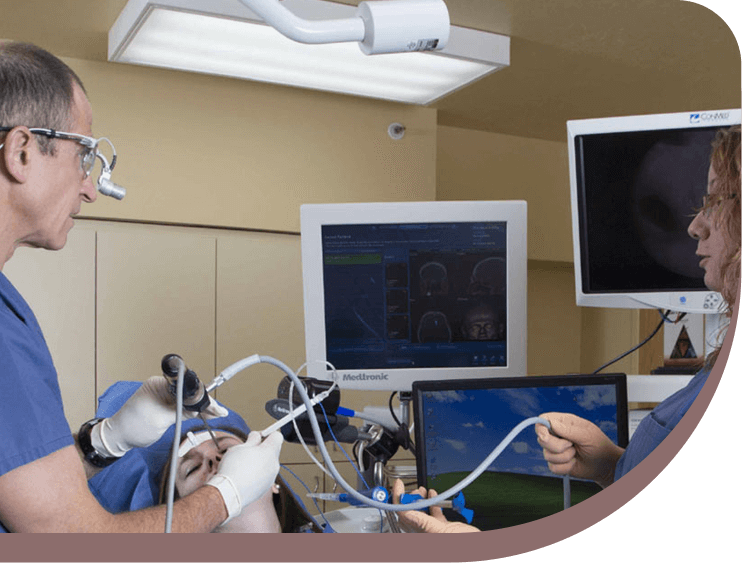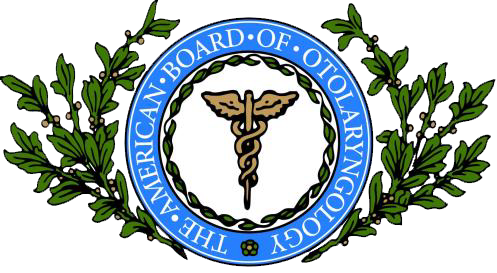
Nasal and Sinus Tumors
Nasal and Sinus Tumors – About
Nasal and sinus tumors can be cancerous or benign (harmless) tumors that appear in the nose or sinus areas.
The exact causes of nasal and sinus cancers are not fully known. Nasal and sinus cancers are more prevalent in people who inhale or handle certain chemicals, like nickel, formaldehyde, or chromium for many years. Men are more likely to develop nasal and sinus cancer than women. Other factors, like smoking, can also increase the risk of developing nasal and sinus cancers.
Only about 2,000 being diagnosed in the United States each year, making cancerous nasal and sinus tumors rare and they vary greatly in size, type, and location. Most of these types of tumors (60 – 70%) occur in the maxillary sinus, while 20 – 30% are in the nasal cavity and 10 – 15% are in the ethmoid sinuses. Cancer in the sphenoid or frontal sinuses is extremely rare, accounting for only 5% of such cancers.
The main treatment type used to treat nasal and sinus cancers is surgery. Radiation therapy and chemotherapy may be given before surgery to shrink a large tumor. Often these therapies are given after you have had surgery to reduce the risk of the cancer returning.
Nasal and Sinus Tumors – Diagnosis
Paranasal sinus and nasal cavity cancers are typically found because of the particular symptoms or signs a person is experiencing. If your doctor believes you might have cancer of the nasal cavity or paranasal sinuses, you will be referred to an otolaryngologist; this is a doctor who essentially specializes in diseases of the ear, nose, and throat; also known as an ENT doctor. The ENT doctor will examine your nasal passages more thoroughly, as well as the rest of your head and neck area. The ENT doctor will take an entire medical history and inspect your head and neck, nasal and sinus areas with an instrument called an endoscope (tool used to look inside the nose). If there is any suspicions of a tumor (mass or growth), imaging studies are conducted and may include MRI scan, CT scan and in certain cases PET-CT scan. If a tumor is noticed on imaging then usually a biopsy is performed to establish exactly what sort of growth is in the area. A biopsy involves extracting a little piece of the suspect tissue. A biopsy is important to determine exactly what kind of tumor is present and whether it is cancerous or benign (harmless). This can be done either in the clinic or the operating room depending on the circumstances. But, there are a number of different types of sinus and nasal tumors and many are treated differently.
Nasal and Sinus Tumors – Treatment
The most important factors to consider when making your treatment plan are the location, type, and the stage (extent) of the cancer. Your cancer care team will also take your general state of health and your personal preferences into consideration. Treatment types for nasal cavity or paranasal sinus cancer may include:
- Radiation therapy
- Targeted therapy
- Surgery
- Chemotherapy
- Palliative treatment
Different treatment options may be used by themselves or in combination with other treatments. When dealing with early stage cancer, surgery may be all that is needed. When working with more advanced cancer, other treatments like radiation therapy, chemotherapy, or targeted therapy may be necessary in addition to or instead of surgery. You may have different types of doctors on your treatment team (often called a multi-disciplinary team) because of the treatment options. These doctors may include:
- A neurosurgeon: a doctor who specializes in surgery on the brain, spine, and other parts of the nervous system.
- A radiation oncologist: a doctor who treats cancer with radiation therapy.
- Many other specialists may be involved in your care as well, including nurse practitioners, nurses, nutrition specialists, social workers, and other health professionals.
- An otolaryngologist: a doctor who specializes in certain diseases of the head and neck (also known as an ear, nose, and throat, or ENT doctor)
- A medical oncologist: a doctor who treats cancer with medicines such as chemotherapy.
Many other health care professionals may be involved in your care as well, including nurse practitioners, nurses, nutrition specialists, social workers, and other health professionals.

Conditions Treated
Follow us


Your Health Starts Here
"*" indicates required fields
